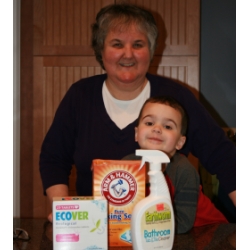By Katherine Friedrich, Based on an interview with Pat Smith
 Pat Smith had over 30 years of experience as a registered nurse. She’d been working in the same office for five years. She was used to her routine at work and at home. Since she believed products had to smell good to be clean, she used perfumed lotions, scented shampoo, dryer sheets and commercial detergent.
Pat Smith had over 30 years of experience as a registered nurse. She’d been working in the same office for five years. She was used to her routine at work and at home. Since she believed products had to smell good to be clean, she used perfumed lotions, scented shampoo, dryer sheets and commercial detergent.
When Pat noticed a musty smell in the carpet near her desk at work one day, she thought one of her coworkers had spilled something. But the smell didn’t go away. Over the next few weeks, Pat developed a chronic headache. At first, she was able to keep it at bay by taking Advil. Once she began forgetting everyday tasks, feeling dizzy, having double vision, and walking into office furniture, she realized she had a serious health problem. Her coworkers were also feeling ill – especially after they sat at her desk.
Pat discovered the carpet had been sprayed with a pyrethroid insecticide.
In the United States, pyrethroids were introduced to replace organophosphates, which are highly toxic. Although safer options are now available, pyrethroids are still used frequently.
The brain damage Pat experienced left her unable to work; she has had neurological and immune problems ever since. At first, she couldn’t focus on basic everyday activities. She left pans on the stove until they burned; she left the water running after she brushed her teeth. She also had difficulty dressing and cooking. When the damage was at its worst, she was unable to answer the phone. She even had to use a walker occasionally. Seven years later, she still has chronic pain, physical weakness, numbness, balance difficulties and double vision.
One of the first things Pat did – as soon as she could spend time on her computer – was to begin educating herself and others about the health risks of pesticides. Gradually, Pat met other people who had chemical injuries. Some of them told her they were living in their cars because they couldn’t find formaldehyde-free housing. (Formaldehyde is used in plywood manufacturing. Later, small amounts of it escape into the air.)
Pat developed physical reactions to some chemicals, although the situation has improved over time. She jokes that she could probably have sniffed out drugs at Logan Airport. When a high school student across the street wore cologne to prom, Pat smelled it without leaving her house. She describes it as a “wall” of cologne. When her neighbors used scented dryer sheets, Pat had a similar reaction.
Pat has taken many steps to make her household safer and to educate other people about chemical safety, including using many of the resources that are found on our Links to further information page. She buys organic groceries if she can afford them, uses safer household cleaners rather than standard bleach and detergent, uses organic lawn products, and does not use pesticides in her garden.
Pat has also been a dedicated activist in support of the Safer Alternatives Bill and encourages legislators to educate themselves about the health impacts of toxic chemicals and then use common sense when considering the value of reducing toxic chemical use in Massachusetts.
